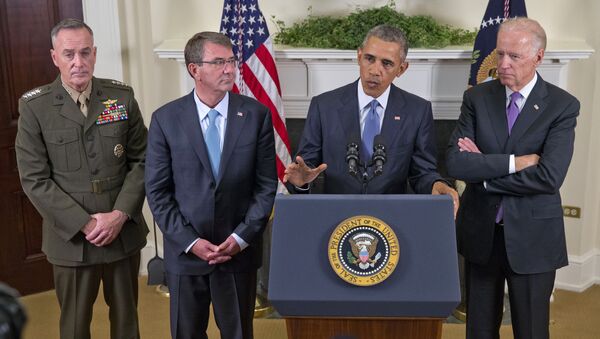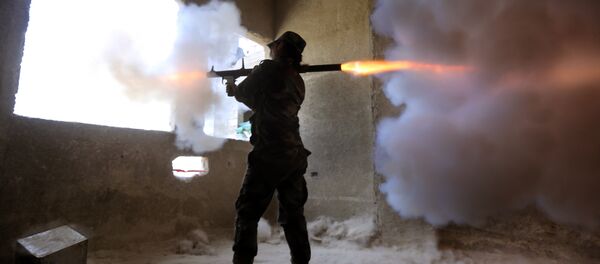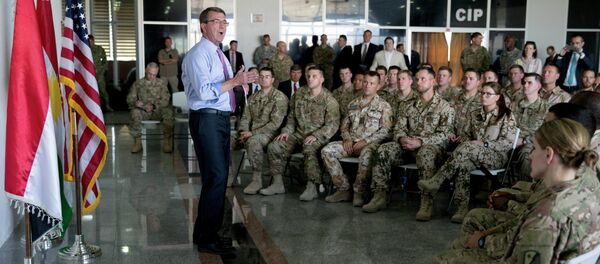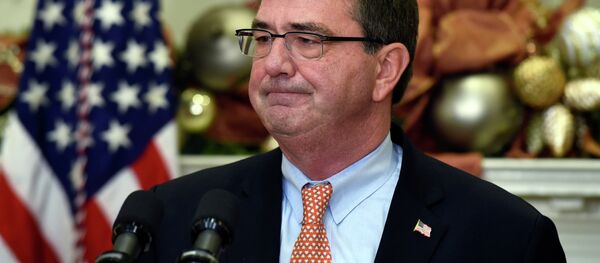It’s easy to see a mixed message in the foreign policy of the United States. On the one hand, Secretary of State John Kerry has indicated a willingness to work with the Russian government in Syria. On the other, the Pentagon just deployed a fleet of F-15Cs to neighboring Turkey to deter “Russian aggression.” The South China Sea is no different, with US Navy ships antagonizing Beijing at the same time that Obama hosts Chinese President Xi Jinping.
While Obama’s White House has done little to cement relations abroad, it’s possible that his inability stems from internal conflict with an overly aggressive Pentagon, led by Defense Secretary Ashton Carter.
"Secretary Carter gave a sober, stark review of national security challenges that seemed out of line with the administration’s approach on Russia, Syria, Ukraine, and even China," Eric Edelman, a former undersecretary during the Bush administration, told Bloomberg.
Edelman was referring to a speech given by Carter at the Reagan President Library over the weekend.
"We do not seek a cold, let alone a hot, war with Russia. We do not seek to make Russia an enemy," he said. "But make no mistake; the United States will defend our interests, our allies, the principled international order, and the positive future it affords us all."
During that same speech, Carter went on to tout a number of clichés about both Russian and Chinese "aggression." He spoke about Moscow’s alleged military involvement in Eastern Ukraine – an oft-repeated though unproven claim – and he spoke about Russia’s “hidden” motives in Syria.
The Kremlin has been clear from the beginning that it seeks to eliminate the self-proclaimed Islamic State terrorist group, an effort the US-led coalition has failed to do in over a year of bombing.
"We have two great powers. This is totally different, something that we haven’t had to deal with in the last 25 years," Carter’s deputy Bob Work said at the end of the speech, referring to Russia and China. "The primary thing we’ve done in the last 12 months is to organize ourselves for combat and to actually think about this problem."
As aggressive as many of America’s actions have been in recent years, they could have been even worse if not restrained by a hesitant White House.
In Ukraine, for example, Carter has publicly supported the shipment of lethal aid to Kiev. President Obama – at least publicly – has never endorsed such a proposal.
In the South China Sea, the Pentagon was advocating for military patrols near Beijing’s artificial islands in the Spratly archipelago long before such action was authorized by the White House. Even once permission was at last granted, the Obama administration placed strict limits on what, exactly, those patrols were allowed to do. The ship's sensors had to remain off and military helicopters were not allowed to accompany the patrols.
Washington has criticized Beijing’s land reclamation efforts as a breach of international law, while China maintains it has every right to build within its own territory and that the islands will be used largely for humanitarian purposes.
"The administration always says there is no military solution, and that’s true," Stephen Hadley, national security advisor to President George W. Bush, told Bloomberg. "But if you are dealing with a Putin or a Xi, there is no political solution that does have a military element."
With that level of aggression emanating from the Pentagon, it’s no wonder US military hardware is popping up across Eastern Europe.






